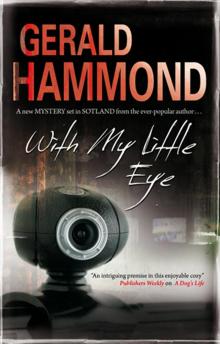- Home
- Gerald Hammond
Snatch Crop Page 6
Snatch Crop Read online
Page 6
Footsteps were approaching, coming along the by-road from the direction of the house that Mrs Thrower had rented. They turned in at the drive. There was something about the uneven rhythm of them that made me uneasy.
I turned to the front door just as Mum opened it. ‘I heard a car,’ she said. ‘Is Ian letting you play with his new toy—?’
She broke off as Mrs Thrower came stumbling into the puddle of light. Her hair and her hands were all over the place and her whole manner was distraught. ‘That man . . .’ she gasped. ‘That man . . .’
Mum is always at her best in a crisis. I would have let Mrs Thrower babble out her story on the doorstep, but Mum had her indoors and sitting in a deep chair with a brandy in her hand in a matter of seconds. ‘Now,’ she said, ‘tell us what’s happened.’
Mrs Thrower took a gulp of brandy and choked. We waited. ‘There was a man,’ she said hoarsely at last.
‘We gathered that,’ Mum said. ‘What did he do? Start from the beginning. You went round to your house to fetch something.’
‘He must have been waiting, in the darkness,’ Mrs Thrower said. She gave a ladylike shudder. ‘When I opened the door and switched the lights on, he appeared suddenly behind me and pushed inside. He was awful, horrible!’
She swallowed the rest of the brandy. She was too ladylike to ask for more, but she sat looking at the empty glass. Mum took the hint and filled it for her.
‘But are you hurt?’ I asked her.
‘Yes. No, not really. Not to say hurt. He . . . he pushed me, more than once. He was a nasty, weaselly man with . . . Would you understand if I said that he had hot eyes?’
Mum and I both said yes.
‘He wanted to know whether Bernard knew that Delia had been kidnapped and I told him that he did. Then he said to tell Bernard that he’d better keep his mouth shut or awful things would happen to Delia.’ Mrs Thrower dabbed at her eyes and sipped from her glass again. ‘I said that I wasn’t in touch with Bernard and he said that I’d better get in touch with him if I wanted to see Delia again.’
‘We’d better phone Ian,’ I said.
‘No!’ Mrs Thrower flung the word out in a squawk that made me jump. ‘He said not to go to the police or they’d do those things to Delia, and to me as well.’
‘Don’t upset yourself,’ Mum said. ‘Finish your brandy and I’ll make a cup of tea.’ I thought that she was going to tell Mrs Thrower to go and wash her face in cold water, but instead she went on, ‘Deborah can tell Ian what you’ve said. He’ll know what to do for the best. Tomorrow, he’ll make some arrangement to smuggle you into the police building, to look at photographs or make up an Identikit or whatever they do.’
After a little more coaxing and reassurance and some more brandy, Mrs Thrower calmed down slightly and agreed that that would be best. The brandy was having its effect and her appearance was made tipsier by her untidy hair. ‘I shan’t be coming back to work,’ she told me. ‘I just couldn’t face it any more. I’m sorry to let you down, but I’m sure you’ll manage somehow.’
I said that I was sure I would and made my escape, leaving the oddments from her desk on the hall table.
Ian walked twice around the car, inspecting it for damage, before he would let me tell him about Mrs Thrower’s visitor. Then he was ready to listen. ‘Was that the same man who was seen collecting Delia?’ I asked him.
‘No.’
‘But you recognise the description?’
‘Not for sure. I’ll find out tomorrow.’
‘At least you’re finding out who they are.’
‘I’d much rather know where they are,’ he said.
*
Three days slipped away.
Ian was still torn between police discipline and a need to discuss his problems with me. He compromised by discussing only those matters which he thought I already knew but, by piecing together the fragments that remained unsaid, I gathered that Mrs Thrower had made an identification of her visitor from a photograph but that the twin searches for her husband and daughter were bogged down. Bernard Thrower, Ian said, had returned his hired car to the hirers, accepted a lift to the nearest railway station and taken a ticket to Edinburgh Waverley. From there, as Ian pointed out, he could have gone on to Glasgow or Dundee, or even London, to hire another car from some small operator and, if he so wished, could return by road. He was certainly lying very low. Of Delia and her kidnappers, and of the kidnappers’ known associates, there was no sign at all. An application to tap the phone-lines of the directors of Sempylene had been turned down. Mr Thrower’s ladyfriend was being monitored strictly – by women detectives, Ian assured me primly, as though I suspected him of hiding in her bathroom cupboard – but there had been no sign of contact.
On the Thursday evening, the whole case stood on its head.
Ian had once again been in Edinburgh for discussion, implied criticism and a general directive to do something clever for God’s sake, but he had phoned to say that he was back in his office and would be home in an hour. He sounded depressed.
I was trying to do everything at once, including catching up with the day’s news – which meant turning up the television (Ian’s) above the noises of the washing machine (a wedding present from Sir Peter), the kettle (ditto from Uncle Ron) and the cyclotherm oven (Wallace and Janet) – so that I almost failed to hear the sound of the doorbell.
When I got to the door, a slim, natural blonde in her thirties was on the step.
Nature favoured me with robust good health and enough strength and stamina to keep up with the men of my family in their thousand and one outdoor pursuits. I wouldn’t have it any other way. I would not want to be fragile, but there are times when I would love to have that often deceptive air of fragility that some women have and which makes men want to wrap them in cotton wool and cuddle them. This woman looked as though a breeze would send her bowling along the street and an unkind word would put her into shock. She wore heavy waterproofs and no make-up and her blonde hair, which showed signs of having been well styled in the not too distant past, had been pressed flat and then combed out, apparently by the use of fingers but, even so, she looked sexier than I do at my best. It was dark outside but her eyes, as near as I could tell under the lamp, seemed to be blue. They would be. There was a motor-scooter parked at the kerb.
‘I’m Elaine Anderton.’
She said it as though I should know the name but it meant nothing to me. For a frantic moment I tried to place her as a friend of a friend, behind counters, on a stool in the local pub or as the secretary of one of our business contacts. Surely she couldn’t be a policewoman? Not even a ten-year-old vandal would come along quietly with somebody so obviously incapable of violent activity.
‘Should I know the name?’ I asked carefully.
‘Oh. I thought you would. Bernard said . . .’ Her voice, which was tremolo, suggesting tears not far away, tailed off.
‘Bernard Thrower? You’re his . . .?’ My voice did the same while I tried to choose the least offensive synonym for ‘mistress’.
‘Yes. Bernard phoned me after he’d come to see you. He said that I should contact you if I didn’t know what to do. He said you were the only person he’d met that he thought he could trust.’
‘Did he, indeed?’ I thought that Bernard must have picked on me because I was fresh in his harassed mind; or else he’d gone out of it. But perhaps, if he was more devious than I gave him credit for, his suggestion of a message and a password had been a trap which I had avoided. ‘You’d better come inside.’
She followed me in, clumsily. I put her clumsiness down to the thick waterproofs and helped her out of them. She stood still like a child being undressed, still speaking. ‘There were people watching me, but I think they were the police. I only had to slip out the back way. It was easy. That’s the way the man came in. I keep my scooter in a shed at the back, and there’s a lane.’
The blast of sound through the open-plan flat did nothing for her look of desperati
on or mine. I turned my wedding presents down or off and led her across the dividing line into the living-room.
‘Do sit down,’ I said. ‘What man?’
She was too distraught to hear me. ‘A man came to the back door. He just walked straight in without a knock or a by-your-leave. He slapped me. Here.’ She pointed to her left cheek. ‘Is there a mark?’
I assured her that her beauty was still unblemished.
‘He told me that Delia would never be seen again if Bernie or I talked to the police. And he said that he’d come back and cut my face up if I told them that he’d been there. He really did have a razor. He showed it to me.’ She made a nervous gesture that nearly knocked over the standard lamp. ‘I don’t even know your name,’ she added. ‘Bernard just called you the factory manager.’
Did she know that I was the wife of the investigating officer? If she didn’t know my name, obviously not. ‘Call me Deborah,’ I said. ‘And do sit down. You’ve heard from Mr Thrower?’
She turned towards me and her skirt swept an ornament off the coffee table. ‘Only twice since he came to see you. He phoned me in an awful hurry. He said that Delia had been kidnapped and everything was going to go mad and he’d have to go even deeper into hiding for a bit. And—’
I had had a long day and my feet were tired. Manners prevented me from sitting down while a guest was standing. Silly, but that was the way I had been brought up. ‘Sit down,’ I said firmly.
‘And he said—’
There was a chair just behind her. I gave her a gentle push and she sat down. I don’t think that she even noticed. I dropped thankfully into another chair.
‘And Bernie said that Delia would be in great danger if the police found him and they’d certainly be watching me so he might not be able to contact me direct.’ She took a deep breath. ‘He phoned once more and said that you were the only person who’d seemed to be sympathetic and he thought he could trust you and that if all else failed we could keep in touch through you. Have you heard from him again?’
‘Not a word.’
‘I don’t know what to do,’ she said. She looked at me like a spaniel awaiting a hand-signal. Real tears were beginning to overflow her lower lids.
‘What did this man look like?’ I asked. ‘The one who threatened you.’
‘Scruffy.’
‘But apart from that?’
‘Very ordinary. He didn’t sound ordinary, he sounded hard. But he looked as if you could pass him in the street without really seeing him.’
Not the weaselly man with hot eyes, then.
It seemed that not only men were vulnerable to that air of ethereal helplessness. ‘Calm down and try to relax,’ I advised her. ‘Have you had anything to eat?’
‘Yes, I think so. Yes,’ she said more positively. ‘I stopped at a café to ask the way here and while I was making up my mind what to say I had something. I can’t remember what.’
‘That’s all right then. I’m going to give you a drink and when you’re feeling better we’ll decide what to do.’ In my ears, my voice sounded very like Mum’s. I nearly told her to go and wash her face in cold water.
While I made inroads into the remains of our duty-free supplies, I thought frantically. The absent Mr Thrower might trust me but I had never asked him to do so. Nor had I given him any promises. My first duty was to Ian and Ian was not the sort of officer who would crash in and make things worse. And he would know what to do. I made up my mind.
There was a telephone extension in the bedroom but if I used it she would hear the main instrument clicking and she might even listen in. Our next-door neighbours were away and had left the key with me.
Still following Mum’s example, I gave her brandy, slightly diluted. ‘I have to go out for a minute,’ I said. ‘You drink this, and when I get back we’ll do some serious thinking.’
‘All right,’ she said. She seemed very trusting.
I dashed next door through a thin drizzle and let myself in. The time-switch had lit a lamp and switched on a small transistor radio. I turned the radio down and dialled. The desk put me through to Ian’s extension.
‘Bernard Thrower’s girlfriend’s just turned up at the flat,’ I said as soon as I heard Ian come on the line. ‘She’s in a bit of a state, not having heard from him and not knowing what’s going on. And she’s had a man at the door, just like Mrs Thrower. Did you know that?’
‘I didn’t even know that she’d left home,’ Ian said. ‘I suppose those WPCs were powdering their blasted noses.’
‘Don’t be sexist,’ I told him. ‘Even men have to go and spend a penny now and again. And she came out the back way, she said. I suppose the kidnappers can’t get hold of Mr Thrower and they want to be sure that he connects Delia’s kidnapping with his silence. Anyway, Mr Thrower told her that he might have to keep in touch through “the factory manager”. Just as you said, he seems to have decided that I’m trustworthy. Perhaps it’s time that you did the same.’
There was a silence on the line. I was about to ask if he was still there when he spoke suddenly. ‘I was just going to phone you,’ he said. ‘A message came in a few minutes ago. Bernard Thrower’s turned up. He’s in the local emergency ward, but I think he’ll be transferred to Edinburgh. He was in a car smash.’
‘Is it bad?’ I asked.
‘Very bad, from what I hear.’
‘How did it happen?’ I was wondering whether he’d been run off the road.
‘Mischance,’ Ian said. ‘A Panda car was doddling along a minor road, minding its own business. He seems to have seen it behind him and thought that it was after him and panicked. He put his boot down and arrived at a bend faster than anybody could have got round it. That was this morning. He wasn’t carrying any identification and we were only alerted to who he was when he woke up for a few seconds and asked to see you.’
‘By name?’
‘By job description. He probably wants you to transmit reassuring messages.’
Some most unpleasant ideas were occurring to me. ‘I presume you’re keeping this very quiet,’ I said.
Ian was ahead of me. ‘God, yes! We can’t take chances with his daughter’s life.’ There was another pause. I could almost hear him scratching the stubble on his neck, his habit when deep in thought. ‘When he goes in to Edinburgh he’ll go into surgery for hours and hours and then be dopey for hours more,’ Ian said at last. ‘I want to get as much as I can before they shift him – if he ever does come to again. Sergeant Ferless is sitting with him for the moment but I’m just off to join them. How trustworthy do you want to be?’
‘Very,’ I said, wondering what I was letting myself in for.
‘Could you break the news to the lady and then bring her to the hospital?’
There are those who seem to enjoy breaking bad news, but I hate it. I wanted to protest, but I could see that I had brought the duty on myself. ‘You’ve got the car,’ I said, ‘and she only has a scooter.’
‘Take a taxi.’
‘Send one for me.’ I could be just as peremptory as he could, on a good day. ‘Not a police car, mind, or she’ll have seven fits.’
I hung up, re-started the radio and locked up carefully.
*
In a certain kind of novel to which I am addicted, I would have returned home to find that she had either vanished or was now lying on my bed, probably naked and certainly dead, transfixed by some unlikely weapon. In real life, I found her still in the same chair, dripping tears into the dregs of the brandy.
‘Have you thought what we should do?’ she asked me hopefully. Evidently I was now the team leader or Brown Owl or something.
I refilled her glass and waited until she had taken another sip. ‘I went out to get some news,’ I said, ‘and I got it. It’s not very good. You’ve got to be brave.’
She put down her glass and looked at me, very white but making an effort. As gently as I could, I told her that her lover was at the hospital, seriously injured.
Surp
risingly, her first thought was neither for him nor for herself and my opinion of her went up. ‘That poor child!’ she said. ‘Either way, things don’t look good for her. If those men find out, they’ll know that they don’t need her any more.’ She drank some more brandy and put down the empty glass so violently that it skidded across the table and on to the floor. She jumped to her feet. ‘I must go to him.’
I picked up the glass and checked it for cracks. ‘We’ll both go. I’ve called for a taxi.’
‘We don’t have to wait for that. We can go on my scooter.’
Even if I had been prepared to ride on a scooter on what was turning out to be a damp night, no way was I going pillion behind a stranger who had absorbed two very large brandies. ‘The taxi’s on its way,’ I said, hoping that it was true. ‘Let’s get you tidied up for hospital visiting.’
She washed her face and put on a little make-up and then stood while I brushed her hair. I had a feeling that I was making a mistake. She was becoming too damned attractive by half and Ian was always susceptible to pathos in a woman, provided only that she was pretty.
She seemed to have accepted the bad news at face value, but as we were going out to Mr Ledbetter’s taxi she pulled back for a moment. ‘This isn’t some sort of trick?’
‘I wish it was,’ I said.
That seemed to satisfy her. ‘I’d rather that it was,’ she said shakily. ‘But I suppose that no trick would change anything now.’ She stooped to get in. We rode up to the hospital in silence, but she was perched on the edge of the seat and I could feel her willing the taxi onward. The Emergency sign was a beacon among the hospital lights. She darted in through the double doors while I was telling the driver to send the bill to my husband.
I caught her up at the desk. Ian was there, in discussion with a doctor who had once stitched my hand when I sliced it while skinning a rabbit. She was trying to ask several simultaneous questions and not making any of them clear.

 Home to Roost
Home to Roost A Dead Question
A Dead Question Twice Bitten
Twice Bitten The Curse of the Cockers
The Curse of the Cockers In Loving Memory
In Loving Memory Illegal Tender (Three Oaks Book 12)
Illegal Tender (Three Oaks Book 12) Cold Relations (Honey Laird Book 1)
Cold Relations (Honey Laird Book 1) A Brace of Skeet
A Brace of Skeet Silver City Scandal
Silver City Scandal Sauce For the Pigeon
Sauce For the Pigeon Cold Relations
Cold Relations Hook or Crook
Hook or Crook The Curse of the Cockers (Three Oaks Book 5)
The Curse of the Cockers (Three Oaks Book 5) Snatch Crop
Snatch Crop Sting in the Tail (Three Oaks Book 6)
Sting in the Tail (Three Oaks Book 6) A Dead Question (Honey Laird Book 2)
A Dead Question (Honey Laird Book 2) In Loving Memory (Honey Laird Book 3)
In Loving Memory (Honey Laird Book 3) Thin Air
Thin Air Sting in the Tail
Sting in the Tail Pursuit of Arms
Pursuit of Arms The Game
The Game Give a Dog a Name (Three Oaks Book 4)
Give a Dog a Name (Three Oaks Book 4) Fair Game
Fair Game The Executor (Keith Calder Book 10)
The Executor (Keith Calder Book 10) Whose Dog Are You? (Three Oaks Book 2)
Whose Dog Are You? (Three Oaks Book 2) Mad Dogs and Scotsmen (Three Oaks Book 7)
Mad Dogs and Scotsmen (Three Oaks Book 7) Cousin Once Removed
Cousin Once Removed The Worried Widow
The Worried Widow A Shocking Affair
A Shocking Affair Dead Weight (Three Oaks Book 11)
Dead Weight (Three Oaks Book 11) Whose Dog Are You
Whose Dog Are You The Revenge Game
The Revenge Game With My Little Eye
With My Little Eye Doghouse (Three Oaks Book 3)
Doghouse (Three Oaks Book 3) In Camera
In Camera Bloodlines (Three Oaks Book 8)
Bloodlines (Three Oaks Book 8) The Unkindest Cut
The Unkindest Cut